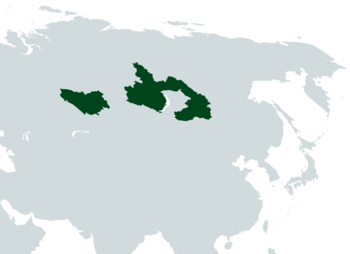Russian Sovereign Slavic Realm: Difference between revisions
Jump to navigation
Jump to search
Mongol Uls (talk | contribs) No edit summary |
Mongol Uls (talk | contribs) No edit summary |
||
| Line 5: | Line 5: | ||
|image_flag = Flag of Russia (1991–1993).svg | |image_flag = Flag of Russia (1991–1993).svg | ||
|image_size = 100px | |image_size = 100px | ||
|image_coat = | |image_coat = Aguila de dos cabezas explayada.svg | ||
|image_size = 100px | |image_size = 100px | ||
|national_motto = | |national_motto = | ||
Revision as of 16:53, 5 May 2024
Russian Sovereign Slavic Realm Russkoye Suverennyy Slavyanskoye Tsarstvo | |
|---|---|
 Areas controlled by the Russian SSR (dark green) | |
| Capital | Moscow (de jure) Omsk (de facto) |
| Official languages | Russian |
| Demonym(s) | Russian |
| Government | Provisional government |
• Tsar | Manduul Temüjin, Batu II |
• Viceroy-Plenipotentiary | Nyam Temuulen |
| Legislature | Duma (de jure) |
| Currency | Mongol Sum (de facto) |
| Date format | dd-mm-yy |
| Driving side | left |
| Internet TLD | .ru.ml (de facto) |
The Russian Sovereign Slavic Realm (Russian: Russkoye Suverennyy Slavyanskoye Tsarstvo), abbreviated as the Russian SSR, is self-proclaimed state in Eurasia under de facto Mongol control. Formed in 2022 after the dissolution of the Russian Soviet Socialist Republic, the state lays claim to all of Russia, but controls only the Altai Krai, Irkutsk Oblast, Kemerovo Oblast, Omsk Oblast, and Zabaykalsky Krai. Its claims are contested by the Russian Soviet It is nominally a part of the Union of Sovereign Slavic Realms, a self-proclaimed Soviet successor state that does not control any territories other than those of the Russian SSR.